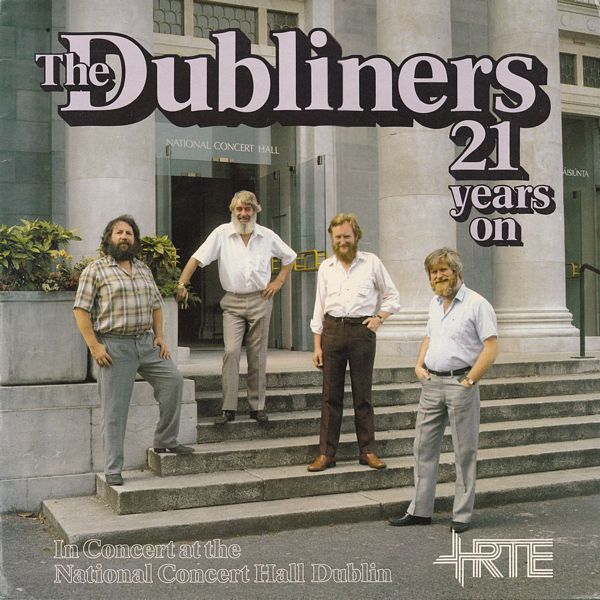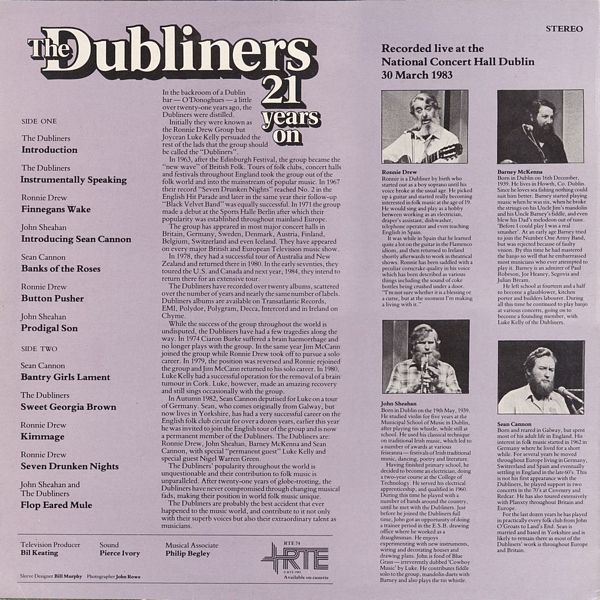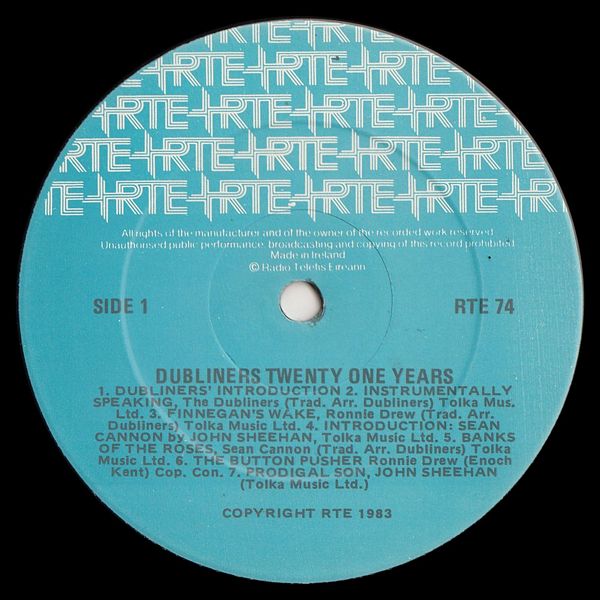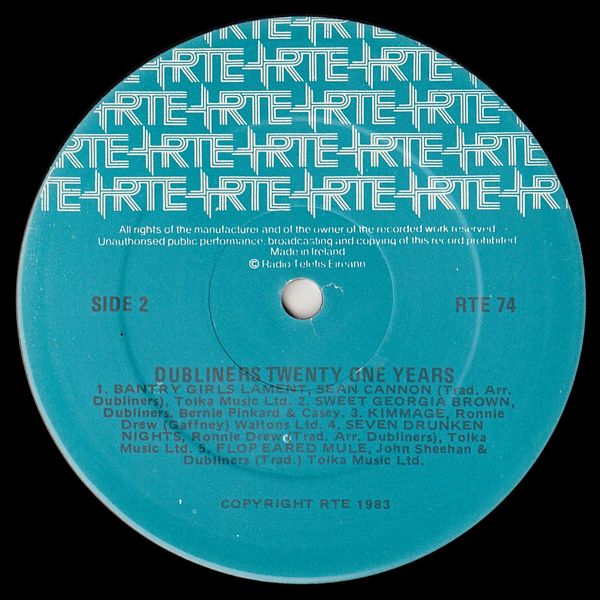

 |


 |
Sleeve Notes
In the backroom of a Dublin bar — O'Donoghues — a little over twenty-years ago, the Dubliners were distilled. Initially they were known as the Ronnie Drew group but Joycean Luke Kelly persuaded the lads that the group should be called Dubliners.
In 1963, after the Edinburgh Festival, the group became the "new wave" of British Folk. Tours of folk clubs, concert halls and festivals throughout England took the group out of the folk world and into the mainstream of popular music. In 1967 their record "Seven Drunken Nights" reached No. 2 in the English Hit Parade and later in the same year their follow-up "Black Velvet Band" was equally successful. In 1971 the group made a debut at the Sports Halle Berlin after which their popularity was established throughout mainland Europe.
The group has appeared in most major concert halls in Britain, Germany, Sweden, Denmark, Austria, Finland, Belgium, Switzerland and even Iceland. They have appeared on every major British and European Television music show.
In 1978, they had a successful tour of Australia and New Zealand and returned there in 1988. In the early seventies, they toured the U.S. and Canada and next year, 1984, they intend to return there for an extensive tour.
The Dubliners have recorded over twenty albums, scattered over the number of years and nearly the same number of labels. Dubliners albums are available on Transatlantic Records, EMI, Polydor, Polygram, Decca, Intercord and in Ireland on Chyme.
While the success of the group throughout the world is undisputed, the Dubliners have had a few tragedies along the way. In 1974 Ciarán Bourke suffered a brain hemorrhage and no longer plays with the group. In the same year Jim McCann joined the group while Ronnie Drew took off to pursue a solo career. In 1979, the position was reversed and Ronnie rejoined the group and Jim McCann returned to his solo career In 1980, Luke Kelly had a successful operation for the removal of a brain tumour in Cork. Luke, however, made an amazing recovery and still sings occasionally with the group.
In Autumn 1982, Seán Cannon deputised for Luke on a tour of Germany. Seán, who comes originally from Galway, but now lives in Yorkshire, has had a very successful career on the English folk club circuit for over a dozen years, earlier this year he was invited to join the English tour of the group and is now a permanent member of the Dubliners. The Dubliners are: Ronnie Drew, John Sheahan, Barney McKenna and Seán Cannon, with special "permanent guest" Luke Kelly and special guest Nigel Warren Green.
The Dubliners' popularity throughout the world is unquestionable and their contribution to folk music unparalleled. After twenty-one years of globe-trotting, the Dubliners have never compromised through changing musical fads, making their position in world folk music unique.
The Dubliners are probably the best accident that ever happened to the music world, and contribute to it not only with their superb voices but also their extraordinary talent musicians.
Ronnie Drew
Ronnie is a Dubliner by birth who started out as a boy soprano until his voice broke at the usual age. He picked up a guitar and started really becoming interested in folk music at the age of 19. He would sing and play as a hobby between working as an electrician, draper's assistant, dishwasher, telephone operator and even teaching English in Spain.
It was while in Spain that he learned quite a lot on the guitar in the Flamenco idiom, and then returned to Ireland shortly afterwards to work in theatrical shows, Ronnie has been saddled with a peculiar corncrake quality in his voice which has been described as various things including the sound of coke bottles being crushed under a door. "I'm not sure whether it is a blessing or a curse, but at the moment I'm making a living with it."
John Sheahan
Born in Dublin on the 19th May, 1939. He studied violin for five years at the Municipal School of Music in Dublin, after playing tin whistle, while still at school. He used his classical technique on traditional Irish music, which led to a number of awards at various feiseanna — festivals of Irish traditional music, dancing, poetry and literature. Having finished primary school, he decided to become an electrician, doing a two-year course at the College of Technology. He served his electrical apprenticeship, and qualified in 1960. During this time he played with a number of bands around the country, until he met with the Dubliners. Just before he joined the Dubliners full time, John got an opportunity of doing a trainee period in the E.S.B. drawing office where he worked as a draughtsman. He enjoys experimenting with new instruments, wiring and decorating houses and drawing plans. John is fond of Blue Grass — irreverently dubbed 'Cowboy Music' by Luke. He contributes fiddle solo to the group, mandolin duets with Barney and also plays the tin whistle.
Barney McKenna
Born in Dublin on 16th December. He lives in Howth. Co. Dublin Since he loves sea fishing nothing could suit him better. Barney started playing music when he was six, when he broke the strings on his Uncle Jim's mandolin and his Uncle Barney's fiddle, and even blew his Dad's melodeon out of tune. 'Before I could play I was a real smasher'. At an early age Barney tried to join the Number One Army Band, but was rejected because of faulty vision. By this time he had mastered the banjo so well that he embarrassed most musicians who ever attempted to play it. Barney is an admirer of Paul Robeson, Joe Heaney, Segovia and Julian Bream.
He left school at fourteen and a half to become a glassblower, kitchen porter and builders labourer During all this time he continued to play banjo at various concerts, going on to become a founding member, with Luke Kelly of the Dubliners.
Seán Cannon
Born and reared in Galway, but spent most of his adult life in England. His interest in folk music started in 1962 in Germany where he lived
for a short while. For several years he moved throughout Europe living in Germany, Switzerland and Spain and eventually settling in England in the late 60's. This is not his first appearance with the Dubliners, he played support in at two concerts in the 70's at Coventry and Redcar. He has also toured extensively with
Planxty throughout Britain and Europe.
For the last dozen years he has played in practically every folk club from John O'Groats to Land's End. Seán is married and based in Yorkshire and is likely to remain there as most of the Dubliners' work is throughout Europe and Britain.